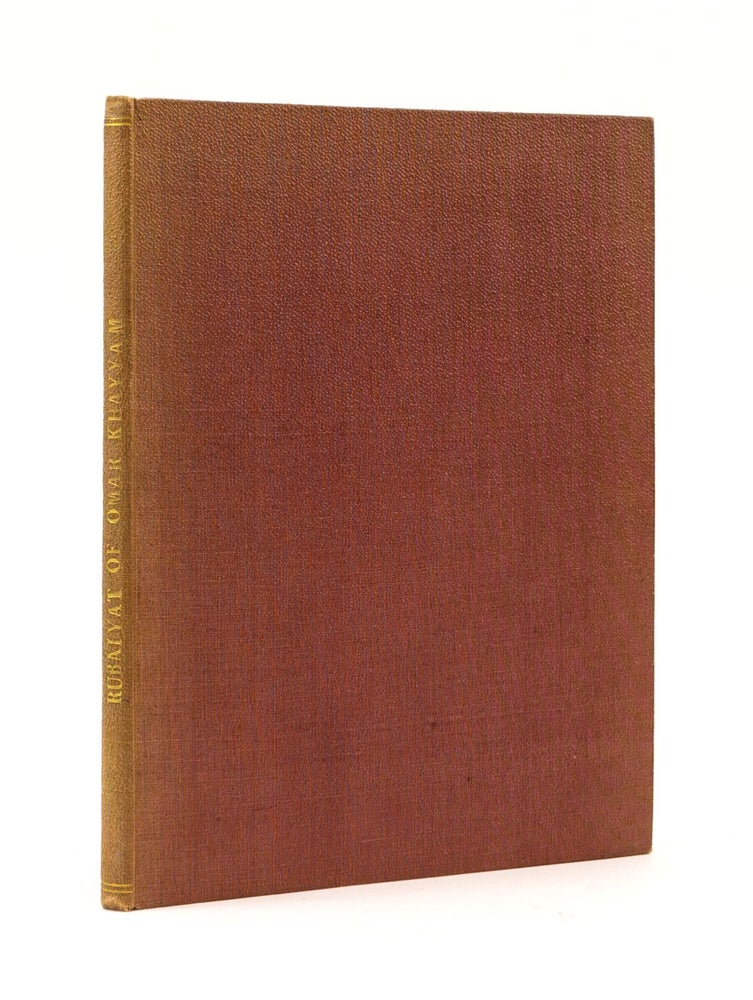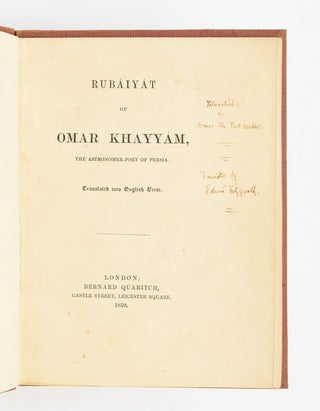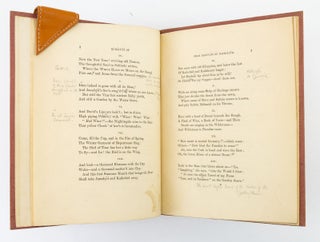RUBAIYAT OF OMAR KHAYYAM, THE ASTRONOMER-POET OF PERSIA.
(London: Bernard Quaritch, 1859). 212 x 160 mm. (8 1/4 x 6 3/8"). xiii, [1], 21 pp. (followed by blank leaves added by the binder). FIRST EDITION, ONE OF ONLY 250 COPIES PRINTED, with the misprint "Lightning" corrected on p. 4.
Near-contemporary pebble-grain rose-colored buckram, flat spine with gilt lettering. In red cloth chemise and handsome later slipcase of rose polished calf, its sides with gilt-ruled border and scrolling cornerpieces, the back with raised bands, gilt compartments with floral sprig centerpiece, two black morocco labels. Front pastedown with ink owner signature of William Bell Scott (see below); title page with ink notations "Tetrastichs [sic] of Omar the Tent Maker" and "Translated by Edward Fitzgerald [sic]" in Bell's hand; marginal annotations in pencil. Rear pastedown with 1879 advertisement for the fourth edition of the Rubaiyat. Potter 1; Ashley II:121; Grolier "English" 97; See Day, "History of English Literature 1837 to Present," pp. 65-66. ◆Cloth spine and board edges a little faded, a touch of foxing to title page, a couple of small marginal stains, but A FINE COPY, clean and fresh internally, in a binding that shows virtually no wear.
This copy of a work Day deems "the single greatest poem of the Victorian era" once belonged to a member of the literary circle that saved FitzGerald's rendition of the 11th century Persian poem quite literally from the remainder bin. Poet and painter William Bell Scott (1811-90) was a close friend of both Dante Gabriel Rosetti and Algernon Swinburne, whom Potter credits with rescuing our 1859 printing from the penny-a-copy bin at Quaritch's and, instead, making it fashionable among the writers who were moving English literature away from Victorian orthodoxy and convention. According to Day, by the end of the 19th century, "a copy of the 'Rubáiyát' upon an Oxford table was a symbol of sophistication." Its popularity over the course of time since then has not just never faltered, but has reached the level of a universally acknowledged masterwork. Son of a wealthy Irish landowner, FitzGerald (1809-83) had enough money to pursue a rather desultory literary career as a "genteel gipsy" (in Terhune's words) before beginning to study languages in middle age. He started his translation of the quatrains ("rubáiyát" in Persian) attributed to "Umar Khayyam" in 1856; according to DNB, about half of FitzGerald's final work paraphrases (rather than directly translates) portions of the 11th century poem, while the rest is original verse inspired by Omar. "The result is generally seen as being in some ways an original English poem, one that is much better known than Omar's poem is in Persian." (DNB) In Jewett's opinion, it certainly earned FitzGerald "a prominent place among the immortals of English literature." In 1858, FitzGerald submitted 25 of the "less wicked" verses to "Fraser's Magazine," only to be rejected. He had 250 copies published, anonymously, at his own expense, but had no luck selling them. Admitting defeat, he gave 200 copies to Quaritch; those that remained unsold when Quaritch moved to Piccadilly in 1860 were either lost or destroyed. Fortunately, by 1861, our former owner and his fellow Pre-Raphaelites had discovered the work, and had begun, with Celtic scholar Whitley Stokes, to promote the poem. Scott's annotations here show how taken he was with the verse. He has noted the then-unrevealed identity of the translator on the title page, along with an alternate rendering of the title, using the term "tetrastich" (four-line verse) and translating "Khayyam" as "Tent-maker." He has corrected a typo in the text ("A. B. 1090" on p. v should have read "A. D. 1090"), and has added information from FitzGerald's "Notes" (which appear after the poem) to the margins of some quatrains to explain terms or allusions. Clearly, he studied the work closely and at some length. Scott likely had the text bound in the plain, sturdy buckram binding because its paper wrapper was too fragile to sustain frequent use. As a result of this precaution, the text itself remains well preserved. (ST17640-023)
Price: $75,000.00



